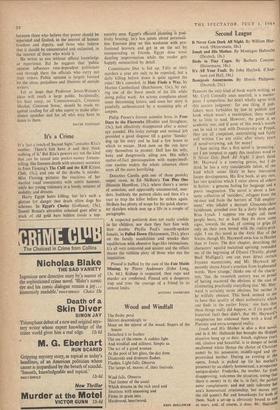It's a Crime
IT'S 'just a touch of Second Sight,' consoles Rita's mother. `There's lots have it and they think nothing of it.' But Rita's powers are not the kind that can be tamed into pocket-money fortune- telling. She foresees death with uncanny accuracy in Joan Fleming's The Chill and the Kill (Crime Club, I5s.), and one of the deaths is murder. Miss Fleming pictures the reactions of her startled rural community with subtle humour, while her young visionary is a lovely mixture of stolidity and dreams.
Harry Egypt hates killing, but he's such a glutton for danger that death often dogs his schemes. In Egypt's Choice (Gollancz, 15s.), Daniel Broun's attractive criminal goes after a stack of old gold bars hidden inside a top- security area. Egypt's efficient planning is posi- tively bracing: he's less astute about personali- ties. Enemies play on this weakness with pro- fessional bravura and get in on the act by masquerading as friends. Egypt does some dazzling improvisation while the reader gets happily mesmerised by detail.
Commissaire Dax is fed up. Fifty or sixty murders a year are only to be expected, but a daily killing before dawn is quite against the rules! He's consoled, in Hate Finds a Way, by Marten Cumberland (Hutchinson, 15s.), by eat- ing one of the finest meals of his life while doing police work. An actress complains 'about some threatening letters; and soon her story is painfully authenticated by a mounting pile of corpses.
Philip Purser's former scientist hero, in Four Days to the Fireworks (Hodder and Stoughton, 15s.), had effectively disappeared after a minor spy scandal. His leaky cottage and manual job provided a good disguise till a gutter `Sunday' dug up his story and he had a few hours in which to escape. Most men on the run have only themselves to protect: Dell has his wife, baby and dangerously ailing son. His wife's matter-of-fact preoccupation with nappy/medi- cine routine makes the, whole inhuman chase seem all the more horrifying.
Detective Camila gets one of these panicky sniper cases, in Ed McBain's Ten Plus One (Hamish Hamilton, 15s.), where there's a series of senseless, and apparently unconnected, mur- ders. Suddenly the pattern clicks and then it's a race to trap the killer before he strikes again. McBain has plenty of scope for his quick charac- ter sketches which sum up a life in a couple of paragraphs.
A respected patriarch does not easily confide in his children, nor dare they face him with their doubts. Phyllis Paul's smooth-spoken fanatic, in Pulled Down (Heinemann, 21s.), plays on the family sensibilities and wrecks their equilibrium with obsessive Iago-like insinuations. It's all very contorted and sinister and the villain shares the ruthless piety of those who ran the inquisition.
Pinaud is baffled by the case of the Fair Maids Missing, by Pierre 'Audemars (John Long, 13s. 6d.). Kidnap is suspected, then rape and murder are confirmed. Pinaud sets a desperate trap and tries the courage of a friend to its utmost limits.
ANTONIA SANDFORD






























 Previous page
Previous page